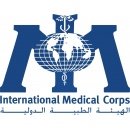Call for Trainers for MHPSS and/or GBV
الوصف الوظيفي
لقد انتهت صلاحية هذه الوظيفة في 2024-09-04
تصفح أحدث الوظائف
عند التقدم لاية وظيفة عن طريق الانترنت، لا تقم بإعطاء معلومات بطاقة الأعتماد او أية معلومات بنكية / مالية لصاحب عمل. نصيحة من جوبس لحمايتك :
آخر الوظائف المعلنة بواسطة
International Medical Corps IMC
المسمى الوظيفي
تاريخ النشر
Child Protection Manager
قطاع غزة
7, Jun
Senior Finance Officer
الخليل, بيت لحم
26, Nov, 2024
Procurement Officer
الخليل, بيت لحم
26, Nov, 2024
Procurement Officer
القدس, رام الله والبيرة, الخلي...
7, Oct, 2024
Program Officer
بيت لحم
26, Sep, 2024
Field Compliance Officer
رام الله والبيرة, الخليل, بيت...
25, Sep, 2024
Field Compliance Officer
قطاع غزة
25, Sep, 2024
Field Compliance Manager
قطاع غزة
25, Sep, 2024









